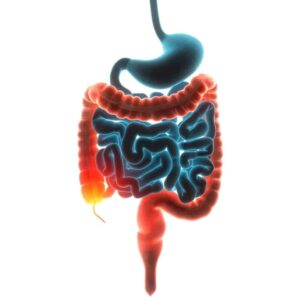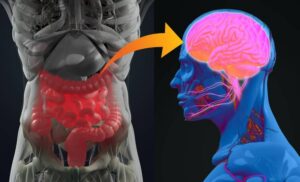9 Warning Signs and Symptoms of Leaky Gut — Could You Be Affected?

Hippocrates was ahead of his time, saying, “All disease begins in the gut.”
“Leaky gut” is a condition in which the lining of the intestines becomes damaged, allowing toxins, bacteria and undigested food particles to “leak” into the bloodstream. You may be surprised to know that many clinicians estimate that it affects 80–90% of people.
Leaky gut is a root cause of many diseases today, meaning that treatment for conditions like autoimmune disorders, IBS, psoriasis, depression, and many more will not work unless the underlying leaky gut issues are cleared first.
In this post:
- Defining Leaky Gut
- What are leaky gut symptoms?
- How do you develop leaky gut?
- Making the Leaky Gut Diagnosis
- How to Heal A Leaky Gut
Defining Leaky Gut
The medical term for leaky gut is “increased intestinal permeability.”
Amazingly, our intestinal lining covers more than 4,000 square feet--about the area of an NBA basketball court!

The intestines are where food is broken down and nutrients are absorbed. They also act as a protective barrier, allowing very small substances through while keeping harmful particles out of your bloodstream, including bacteria, viruses, undigested food particles, and toxins.
When the gut becomes permeable, these unwanted toxins enter the bloodstream, causing widespread inflammation and triggering a response in the immune system.
Unfortunately, mainstream medical doctors do not always recognize this syndrome or know how to treat it. Instead of receiving treatment for the cause of your symptoms (which may include diarrhea, constipation, headaches, brain fog and fatigue), you end up receiving treatment that only addresses the symptoms themselves.
This misguided protocol leads to “chasing symptoms”—one leading to the next until a catastrophic disease takes hold, or until you find a practitioner that is willing to dig down to the cause and treat the disease.
Let’s take a look at the many “diseases” where the root cause may be a leaky gut. You may be one of the many misdiagnosed individuals with this ailment.1
What are leaky gut symptoms?
The primary symptoms of leaky gut are:
1. Food allergies or food sensitivities. Yeast and other toxins spilling into your bloodstream trigger an allergic response, making allergies the number one symptom associated with a leaky gut. Studies have shown a direct correlation between children with food allergies and increased intestinal permeability.2
Some of the most common food allergies or sensitivities associated with leaky gut include dairy, wheat, eggs, soy, corn and nightshade vegetables. Eating foods containing these items may cause abdominal pain, bloating, diarrhea, constipation, swelling, migraines, or even allergy-triggered asthma.
In order to support your intestines as they heal, it’s best to steer clear of those foods that your body reacts to as foreign invaders. Sometimes healthy foods like nuts, tomatoes, or beans can be problematic for someone with a diseased gut, but with a period of a restricted diet and good treatment, they can eventually return to eating those foods.
You can find out what those foods are by going on an elimination diet, like the one built into our 26-Day Detox.
As you add food groups back in, one by one, you’ll be able to identify which ones you’re sensitive to.
2. Autoimmune disorders, like fibromyalgia, chronic fatigue syndrome, or lupus. More than 70 percent of your immune system’s cells are located in your GI lining.3
A healthy gut lining keeps bad guys like microorganisms and toxins within the intestine, where the immune system can kill or disarm them. As permeability in this lining increases, the “baddies” can seep out into the body, triggering antibodies and eventually leading to an autoimmune response.4
3. Poor digestion, which can show up as bloating, gas, constipation, loose stools, heartburn, and nutrient malabsorption. These symptoms are signs that the lining of the intestine is inflamed and unable to break down food to the point that nutrients can be absorbed.
Researchers at Functional Medicine University estimate that “leaky gut” accounts for at least 50 percent of chronic bowel complaints.5

4. Inflammatory Bowel Disease (IBD), including Irritable Bowel Syndrome (IBS), Crohn’s, or colitis. These painful diseases inflame the intestinal tract, and are often associated with both diarrhea and constipation.
New studies on patients suffering with ulcerative colitis and IBS show that their colons are significantly more permeable (“leaky”) than normal.6
5. Thyroid issues such as hypothyroidism, Hashimoto’s thyroiditis, or Graves’ disease. Studies show a strong correlation between leaky gut and the development of Hashimoto’s thyroiditis, a condition in which the immune system attacks the thyroid.7
Graves’ disease, another autoimmune disease, is the most common cause of hyperthyroidism and is associated with both gluten sensitivity and leaky gut.8
The common links between Hashimoto’s thyroiditis and Grave’s disease are that they affect the thyroid, usually involve an environmental trigger, and are associated with leaky gut. Graves, however, leads to an overactive thyroid gland while Hashimoto’s depresses thyroid function.
6. Adrenal fatigue and slow metabolism. Stress causes your adrenal glands to release cortisol, a hormone that reduces inflammation, raises your blood sugar level, increases your awareness, and prepares you for fight-or-flight.
It’s a wonderful system when a tiger is chasing you and you have to think and act fast. However, if faced with chronic stress, the adrenals eventually grow weary … and so do you.
Stress also causes the brain to release a chemical called corticotropin releasing factor, or CRF. This chemical causes inflammation in the gut and increased permeability.
A vicious cycle ensues, with stress causing leaky gut, and leaky gut creating stress within the body.
7. Mood disorders, including anxiety, depression, and autism. Scientific American quoted several studies that concluded that leaky gut may allow substances to pass from the intestine to the bloodstream that harm the brain.
Among the findings: 35 percent of depressed participants showed signs of leaky gut,9 and as many as 9 out of 10 individuals with autism suffer from leaky gut.
Interestingly, in a study of mice that demonstrated autism-like symptoms, those who were treated with beneficial bacteria showed changes such as less anxious behavior and increased communication levels.10
8. Chronic pain in joints and muscles, including arthritis and headaches. When the contents of your intestines, such as particles of food and bacteria, leak into your gut, the immune system is activated to combat the invaders.
Inflammatory chemicals then travel throughout your body, causing widespread inflammation that results in pain in both the muscles and joints. Researchers have also linked this type of inflammation to migraines.11
9. Skin problems, including eczema, psoriasis, rosacea, acne, and age spots. Skin rashes, too, are a sign that your body, overloaded with toxins leaked from the gut, is trying to dump them out through the skin.
No amount of skin cream or rash ointment is going to fix a symptom that originates from the gut! These skin problems must be treated from the inside, by healing the source of the issue.

10. Brain fog. Many people suffer from brain fog without even knowing it. The symptoms sneak up on them, and the low energy, forgetfulness, apathy, mood swings, confusion, and restless nights become the “new normal.” They may chalk it up to hormones, aging, or busy-ness.
But having a healthy gut is intrinsically tied to having a healthy, alert brain. For example, almost 95 percent of serotonin (the “happy” chemical) is created in the gut, one example of why the gut is now being called the “second brain.”
The same gut processes are also responsible for huge percentages of tryptophan and melatonin, neurotransmitters that regulate the sleep/wake cycle, oxytocin (the “love” hormone), and hormones regulating appetite and metabolism.
A leaky, inflamed gut biome can’t produce these essential chemicals, resulting in brain fog (and worse).
How do you develop leaky gut?
Intestinal permeability is regulated by zonulin, a protein only discovered in 2000. This protein monitors the tight junctions that allow very small molecules to enter the bloodstream, while keeping the larger ones locked within the intestine.
When too much zonulin is present, these junctions loosen, and leaky gut ensues.12
But what creates too much zonulin? The research is new and ongoing, but one definitive cause is gliadin, a protein found in gluten from wheat and other cereal grains. (There are many gluten proteins, and gliadin is just one of them.)
Other known causes that trigger zonulin include the overgrowth of candida albicans, a yeast that normally lives in the intestines, and parasitic infections.
Making the Leaky Gut Diagnosis
There is a test you can take that will help determine if you have leaky gut. Called the “Intestinal Permeability Test,” it measures the ability of two sugar molecules to go through the digestive lining: mannitol and lactulose.
If you’d rather steer clear of labs and medical prescriptions, you can change your diet to see if your symptoms improve, beginning with a science-based, effective detox program that includes an elimination phase to check for food triggers.
Related Post: Do You Really Need Prebiotics?
I also believe that after correcting your gut issues, a bi-annual detox is one of the best ways you can prevent re-occurrence.
How to Heal A Leaky Gut
Now for the good news: you can heal your gut by changing your diet, reducing stress, and balancing your intestinal bacteria.
- Eliminate the foods you know you’re sensitive to, plus a few more that are common triggers: sugar, processed food, and foods containing soy, gluten, dairy, or any GMO ingredients.
- Make organic greens, veggies, and fruit your main fare. Get as many different colors in your daily diet as possible to get a wide range of bioflavonoids, polyphenols, and fiber.
- Eat healthy, anti-inflammatory omega-3 fats like organic coconut oil, olive oil, and sprouted flax.
- Take a high-quality, broad-spectrum probiotic with at least 15 strains, a good prebiotic, and digestive enzymes.
- Add bone broth to your diet, for its naturally healing collagen and proteins.
- Use cleansing herbs, like grape seed extract and black walnut to clear out bad bacteria and yeast, along with strong natural anti-inflammatories, like curcumin (the active ingredient in turmeric).
Related Post: What Are Probiotics Benefits? 11 Signs You're Deficient and What to Do About It
Remember, too, that stress plays a fundamental role in the development of leaky gut. While your improving your diet, make time in your schedule for caring for yourself.
Take time to do the things you really love and find relaxing. If you haven’t tried healing activities such as yoga, meditation, and walking in nature, now may be the time to experiment. Find something that brings you joy and make it a point to spend even a little bit of time doing it every day.
And, of course, don’t forget to drink your daily green smoothie!
Read next: Why Do I Get Constipated or Not Lose Weight On Green Smoothies?

Disclosure: This post may contain affiliate links that help support the GSG mission without costing you extra. I recommend only companies and products that I use myself.

Sources
- Arrieta, M.C. et al. Alternation in Intestinal Permeability. Gut. 10/2006. https://www.ncbi.nlm.nih.gov/pmc/articles/PMC1856434/
- Javinen, KM et al. Intestinal permeability in children with food allergy on specific elimination diets. Pediatric Allergy Immunology. 09/2013. https://www.ncbi.nlm.nih.gov/pubmed/23909601
- Vighi, G. Allergy and the Gastrointestinal System. Clinical & Experimental Immunology. 09/2008. https://www.ncbi.nlm.nih.gov/pmc/articles/PMC2515351/
- Qinghui, Mu. Leaky Gut as a Danger Signal for Autoimmune Diseases. Frontiers in Immunology. 05/2017. https://www.ncbi.nlm.nih.gov/pmc/articles/PMC5440529/
- Grisanti, Ronald D.C. Leaky Gut: Can This Be Destroying Your Health? Functional Medicine University. https://www.functionalmedicineuniversity.com/public/Leaky-Gut.cfm
- Gecse, K. Leaky Gut in Patients with Diarrhea-Predominant Irritable Bowel Syndrome and Inactive Ulcerative Colitis. Digestion. 2012. https://www.karger.com/Article/Abstract/333083
- Kouki, Mori. Does the Gut Microbiota Trigger Hashimoto’s Thyroiditis? Discovery Medicine. 11/2012. http://www.discoverymedicine.com/Kouki-Mori/2012/11/27/does-the-gut-microbiota-trigger-hashimotos-thyroiditis/
- Myers, Amy M.D. The Gluten, Gut and Thyroid Connection. Amy Myers MD. https://www.amymyersmd.com/2015/07/the-gluten-gut-and-thyroid-connection/
- Rodriguez, Tori. Gut Bacteria May Exacerbate Depression. Scientific American. 11/2013.
- Moyer, Melinda. Gut Bacteria May Play a Role in Autism. Scientific American. 09/2014. https://www.scientificamerican.com/article/gut-bacteria-may-play-a-role-in-autism/
- van Hemert, Saskia et al. Migraine Associated with Gastrointestinal Disorders: Review of the Literature and Clinical Implications. Frontiers in Neurology. 11/2014. https://www.ncbi.nlm.nih.gov/pmc/articles/PMC4240046/
- Van der Walle, Christopher et al. Modulation of the Intestinal Tight Junctions Using Bacterial Enterotoxins. Science Direct. 2011. https://www.sciencedirect.com/topics/medicine-and-dentistry/zonulin
- RadhaKrishna, Rao. Role of Glutamine in Protection of Intestinal Epithelial Tight Junctions. Journal of Epithelial Biological Pharmacology. 01/2012. https://www.ncbi.nlm.nih.gov/pmc/articles/PMC4369670/
- Sturniolo, G. C., Di Leo, V., Ferronato, A., D'Odorico, A., & D'Inca, R. (2001). Zinc supplementation tightens "leaky gut" in Crohn's disease. Inflamm Bowel Dis, 7(2), 94-98.
- Rapin, Jean Robert. Possible Links between Intestinal Permeability and Food Processing. Clinics. 06/2010. https://www.ncbi.nlm.nih.gov/pmc/articles/PMC2898551/
Posted in: 12 Steps To Whole Food, Detox, Health Concerns, Whole Food















